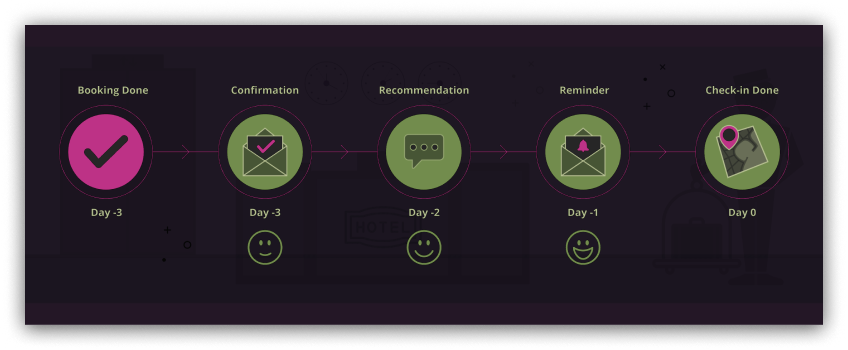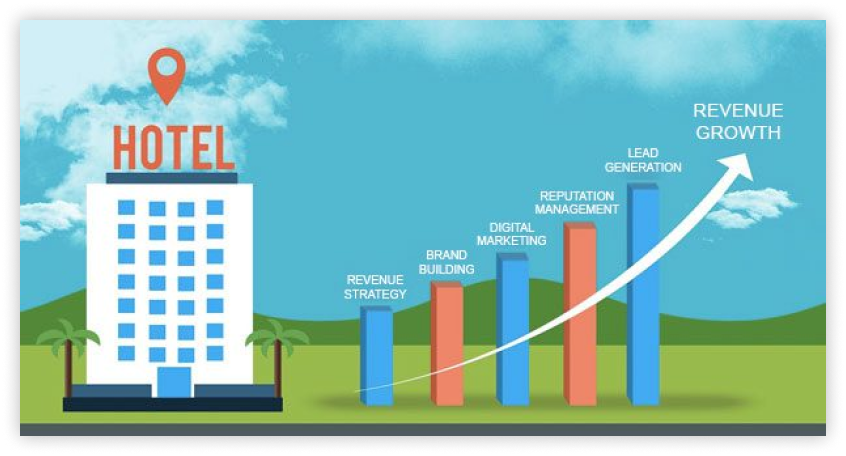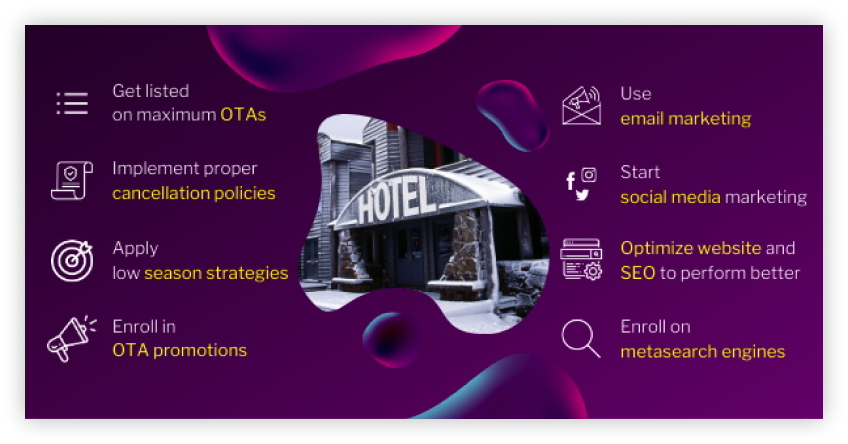Introduction
As a hotel owner, you know that marketing is essential to your success. You must be searching for how to improve lead generation for hotels. Generating leads for hotels involves various strategies to attract potential guests and convert them into actual bookings. Whether you opt for an SEO agency or handle lead generation internally, the key is to focus on various marketing channels, leverage technology, maintain an engaging online presence, and consistently refine strategies based on performance metrics.
In this article, we will explore the importance of lead generation for the hotel industry, the challenges faced in the process, how to get started, succeed, and provide ten effective ways to generate leads.

( Image Source: webengage )
What is the Importance of Lead Generation for the Hotel Industry?
Effective lead generation is the lifeblood of a successful hotel. Here are five key reasons why it is crucial:
- Drive more revenue: Generating leads means attracting potential guests who may become paying customers, ultimately increasing a hotel’s revenue.
- Increase visibility: A well-executed lead generation strategy can boost a hotel’s online visibility, making it easier for potential guests to discover and consider your establishment.
- Understand your guests: Effective lead generation allows hotels to collect valuable data on their guests, enabling personalized marketing and tailored services.

( Source: Revnomix )
What are the Challenges Faced by Hotels to Generate Leads?
While lead generation holds immense potential for hotels, it comes with its fair share of challenges:
- High Customer Acquisition Rate: It can be expensive and time-consuming to acquire new customers, making it essential to focus on retaining existing ones. Online Travel Agent (OTA) platforms, which are now popular, impose hefty commissions on hotels for lead generation, leading to higher acquisition costs and reduced hotel profits.
- Managing Online Reputation: Online reviews and ratings can significantly impact a hotel’s image. Handling negative feedback and maintaining a positive online presence is a constant struggle.
- Struggling to Keep Up with Technology: The ever-evolving technology landscape can be overwhelming for hotels, especially for those with limited resources and expertise.
- Low Marketing ROIs: Measuring the return on investment for marketing efforts can be challenging, and many hotels struggle to allocate their resources effectively. Without careful planning and execution of your marketing strategy, you could waste a significant budget with no positive outcomes.
How to Get Started in Hotel Marketing?
According to Hotel Charts, the global hotel industry is expected to grow at a rate of 20% from 2018 to 2029. You must create a good strategy for lead generation for hotels and build relationships with potential customers. To embark on a successful journey in hotel marketing, you need a solid foundation. Start with these key steps:
- Understand your target audience: Begin by conducting market research to identify your ideal guests. Consider demographics, psychographics, and their preferences. Understanding your target audience is crucial for tailoring your marketing efforts effectively.
- Analyze your competition: Study your competitors to identify what sets your hotel apart. Look at their digital marketing strategies, pricing, and guest reviews to find opportunities to differentiate your hotel.
- Market your brand: Develop a strong and consistent brand identity that reflects your hotel’s unique selling points. Your branding should be reflected in your website, logo, and all marketing materials.
- Activities to generate leads: This refers to the specific tasks or activities that will generate leads for your business. There are many activities you can use to generate leads, but some of the most common include social media outreach, retargeting, email marketing, website visits and more.
- Create an attractive offer: Develop compelling packages, promotions, and pricing strategies to entice potential guests. Offer unique experiences or perks that cater to your target audience’s needs and desires.
- Plan and execute your campaign: Develop a comprehensive marketing plan that outlines your goals, strategies, and tactics. This plan should include both online and offline marketing strategies, such as advertising, public relations, and email marketing. The campaign length is how long you’ll be taking to generate qualified leads from your target audience. For example, if you want to increase sign-ups for your email list as part of your email marketing strategy, a shorter campaign would be more effective than one that lasts longer.
How to Successfully Success in Hotel Marketing?
Building a comprehensive hotel marketing strategy to increase lead generation for hotels is key to success. But before making any marketing decision, there are some questions you need to keep in mind so that, while planning the strategies, you will know what the main objective of the plan is.
- What type of traveller are you targeting? Are you trying to attract budget-conscious tourists or luxury guests?
- How do you want your hotel to stand out from the competition? Is it through its design, service, or location?
- What channels will you use to promote your property? Do you have a website, social media, or even a paid advertising campaign?
- Who will be leading your marketing efforts? Is it a one-man show, or do other team members help manage all aspects of the marketing campaign?
Succeeding in hotel marketing requires dedication and a strategic approach. Here are some tips to help you stand out:
- Easily Searchable Online: Optimize your hotel’s online presence through search engine optimization (SEO) to ensure potential guests can find you easily on the internet.
- Different Marketing Strategy During Peak Seasons: Tailor your marketing approach to capitalize on peak seasons or local events, leveraging the increased demand.
- Provide Incentives to People: Offer special promotions, discounts, or loyalty programs to entice potential guests and encourage repeat business.
- Build Local Partnerships: Collaborate with local businesses and attractions to enhance the overall guest experience and create unique packages.
- Market Both the Hotel and Its Location: Showcase not only your hotel but also the local attractions, culture, and experiences that can draw guests to your area.
- Breathtaking and Simple Website: Invest in a visually appealing and user-friendly website that showcases your property and makes booking easy.
- Customer Loyalty Program: Create a loyalty program to reward repeat guests, fostering long-term relationships and repeat business.
10 Effective Ways to Generate Leads for Hotels
If you’re looking to increase lead generation for hotels, you’ll need to be diligent in your pursuit. You can do this by doing a little bit of research on the best methods, being willing to give away your time, and targeting specific demographics. However, it takes more than just a few tactics to succeed with hotel leads. In order to generate quality leads and make the most of your efforts, you need to put in the hard work.

( Image source: eZee Absolute )
Here are ten common and effective lead-generation strategies in the hotel industry:
- Retargeting: Use retargeting ads to re-engage website visitors who have shown interest in your hotel. Display targeted ads to remind them of your offerings and entice them to make a reservation.
- Social Media Marketing: Utilize social media platforms like Facebook, Instagram, and Twitter to create engaging content, run targeted ads, and promote special offers. Social media can be a powerful tool for connecting with potential guests.
- Influencer Marketing: Collaborate with travel influencers who can showcase your hotel to their followers. Influencers’ recommendations and firsthand experiences can greatly influence potential guests.
- Virtual Events: Host virtual events like webinars, virtual tours, or live Q&A sessions to showcase your hotel’s amenities and engage with potential guests. This can be an effective way to generate leads and build brand awareness.
- PPC Advertising: Run pay-per-click (PPC) advertising campaigns on search engines and social media platforms. Target specific keywords and demographics to attract potential guests actively searching for accommodation.
- Cross Promotion: Partner with local businesses, tourist attractions, or event organizers to cross-promote each other. This can help you tap into each other’s customer bases and generate leads through referrals.
- Email Marketing: Build and maintain an email list of past and potential guests. Send out regular newsletters with updates, special offers, and personalized recommendations to keep potential guests engaged. Make sure all of your email campaigns are designed specifically for Hotel visits (not other addresses).
- OTA Platforms: Partner with online travel agencies (OTAs) like Booking.com, Expedia, and Airbnb to gain access to their extensive user base. Optimize your profiles on these platforms and maintain competitive pricing.
- Effective Content Marketing: Create valuable and informative content ideas for your website, blog, and social media. Highlight your hotel’s amenities, local attractions, and guest experiences to attract and engage potential guests.
- SEO (Search Engine Optimization): Optimize your website and online content for search engines to improve your online visibility. Use relevant keywords, meta tags, and high-quality images to increase your chances of appearing in search results.
By following these tips, you’ll be on track to gain access to the best lead generation for hotels and grow hotel businesses!
Get Help With Hotel Lead Generation
Generating leads for hotels can be a great way to get more business. It not only drives revenue but also enhances guest experiences and strengthens a hotel’s position in the market. By collaborating with experts of an SEO agency, hotel owners can efficiently generate leads, maximize their revenue potential, and stay ahead in the competitive hospitality landscape. In this era of evolving technology and changing guest preferences, leveraging external expertise is a strategic move that can lead to long-term success in the hotel industry.


